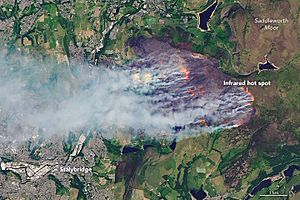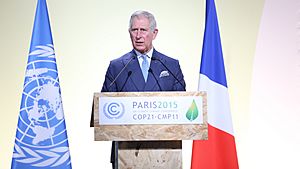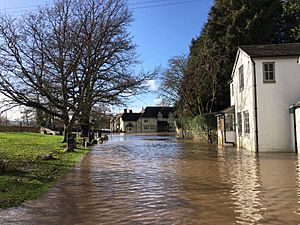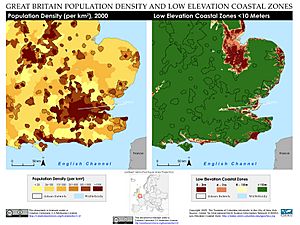Climate change in the United Kingdom facts for kids
Climate change is making big changes to the environment and people in the United Kingdom (UK). The UK's weather is getting warmer, with summers becoming drier and winters wetter. We are seeing more storms, floods, droughts, and heatwaves. Also, sea level rise is affecting areas along the coast. The UK has also added to climate change by releasing more greenhouse gases per person than the world average. These changes are affecting the UK's economy and creating risks for people's health and nature.
The government has promised to cut emissions by 50% of 1990 levels by 2025 and reach net zero by 2050. In 2020, the UK aimed to cut emissions by 68% by 2030 as part of its Paris Agreement promises. By 2022, the UK had already met its goal of cutting carbon emissions by 50% from 1990 levels. At that time, more than 40% of the country's electricity came from renewable sources. The UK stopped using coal power in 2024. The UK Parliament passed laws about climate change in 2006 and 2008. The 2008 law was the first time a government legally required a cut in greenhouse gas emissions. The UK Climate Change Programme started in 2000, and the Climate Change Committee gives advice on how to reach emission targets. In 2019, Parliament declared a 'climate change emergency'. The UK has also played a big part in international efforts to fight climate change, including at UN conferences.
British politicians have talked about climate change since the late 1900s. However, it gained much more attention from politicians, the public, and the media in the UK starting in the 2000s. Surveys show that most Britons are worried about climate change. The British royal family has also made this issue a priority. King Charles III has spoken out about "climate change, pollution and deforestation" for the "last 50 years". Many climate change protests have also happened in the UK.
Contents
Greenhouse Gas Emissions
How Climate Change Affects Nature
Temperature and Weather Changes
The Central England temperature record, which has been kept since 1659, shows that temperatures have gone up. This matches what we expect from human-caused climate change, not just natural weather changes. The Met Office says that climate change will make UK winters warmer and wetter, and summers hotter and drier. We will still have Spanish plumes, but they will bring more intense weather, like hotter summer days and stronger summer thunderstorms.
By 2014, the UK had experienced seven of its warmest years and four of its five wettest years between 2000 and 2014. Higher temperatures cause more water to evaporate, which then leads to more rainfall. In 2014, England had its wettest winter in over 250 years, causing widespread flooding.
In parts of southeast UK, the temperature on the hottest days of the year increased by 1°C every decade between 1960 and 2019. The highest temperature ever recorded in the UK was 40.3°C in Coningsby during the 2022 heatwave. In 2020, it was very unlikely to reach 40°C, but now it is 10 times more likely than it would be without human impact on the climate. If emissions are moderate, temperatures above 40°C could happen every 15 years by the end of the century. If emissions are high, it could happen every 3–4 years. Summers with temperatures above 35°C currently happen every 5 years in the UK, but could happen almost every other year by 2100 with high emissions.
Extreme Weather Events
The Met Office states that the UK will experience more frequent and intense extreme weather events because of climate change.
Floods
More rainfall from warmer, wetter winters means more flooding is expected. The UK government has an interactive map that shows areas at risk of flooding.
Heat Waves
Heatwaves are becoming stronger and more common in the UK due to climate change. Nine of the UK's ten hottest days on record have happened between 1990 and 2022. The 2022 heatwave led to the first "code red" extreme heat warning in the country. This caused a national emergency, leading to wildfires and widespread damage to buildings and roads.
Sea Level Rise
Between 1900 and 2022, the UK's sea level rose by 16.5 cm. The speed of this rise more than doubled between the early 1900s and early 2000s, reaching 3-5.2 millimetres per year. By 2050, it is thought that about a third of England's coast will be affected, meaning nearly 200,000 homes might need to be left. The areas most affected will be the South West, North West, and East Anglia.
Water and Drought
Droughts in the UK are expected to become more serious. The quality of water in rivers and lakes might get worse. This is because of higher temperatures, less water flowing in rivers, and more algal blooms in summer. In winter, increased river flows can also cause problems.
How Ecosystems Are Affected

Warmer temperatures are affecting wildlife and plants. Some species are moving further north, and Scottish alpine plants have decreased. Since spring is arriving earlier each year, many plants and animals cannot adapt fast enough. Birds are affected by climate change. Warm-weather birds like cattle egrets and purple herons were seen breeding in the UK for the first time in the 2010s. Meanwhile, cold-adapted birds like lapwings have declined. More regular droughts also have long-term effects on many British species and natural areas. For example, in 2022, the Ouse Washes wetlands were at risk of drying out.
Climate change will also affect sea life around the British Isles, including some fish that are important for fishing. Many fish species are expected to move to different areas, with cold-adapted species decreasing and warm-adapted species becoming more common.
How Climate Change Affects People
Health Effects

The National Health Service calls climate change a "health emergency". They point to how heatwaves, floods, and storms affect health. They also note the increased spread of infectious diseases like tick-borne encephalitis and vibriosis.
Because of climate change, the UK has seen a big increase in severe heatwaves, which have serious health impacts. The 2022 heatwaves led to nearly 3,000 extra deaths. This means people who were not expected to die during that time. This was the highest number of deaths during heatwaves since 2004. Most of these extra deaths were among people over 65. Without efforts to reduce climate change or adapt to it, heat-related deaths could increase six times by the 2050s. This would especially affect children, the elderly, and people with existing health problems.
Flooding in the UK is another big danger, currently affecting over six million people. This number is expected to rise a lot as temperatures increase. Besides physical dangers, floods can cause severe and lasting mental health problems for those who survive them, including post-traumatic stress disorder (PTSD).
Economic Effects
The government says that the number of homes at risk of flooding will reach up to 970,000 in the 2020s. This is up from about 370,000 in January 2012. The costs of flooding and managing flood risk are about £2.2 billion a year for the country. This is much more than the less than £1 billion spent on flood protection and management. UK farming is also being affected by drought and changing weather.
In 2020, PricewaterhouseCoopers estimated that Storm Dennis caused between £175 million and £225 million in damage to homes, businesses, and cars. Storm Ciara cost up to £200 million. Friends of the Earth criticized the British government for planned cuts to flood defence spending. Protecting against the increasing flood risk from climate change needs more and more investment. In 2009, the Environment Agency calculated that the UK needed to spend £20 million more each year compared to 2010-2011, just to keep up with climate change until 2035.
The British government and economist Nicholas Stern published the Stern Review on the Economics of Climate Change in 2006. This report said that climate change is the biggest economic problem ever seen. It presents a unique challenge for how we think about money and markets. The Review suggested ideas like environmental taxes to reduce economic and social problems. Its main conclusion was that taking strong action early on climate change is much cheaper than doing nothing. The Review pointed out how climate change could affect water, food, health, and the environment. Without action, the total costs of climate change could be like losing at least 5% of the world's total economic output (GDP) every year, forever. If more risks and costs are included, this could rise to 20% of GDP or more. The review's simple message is: the benefits of acting early and strongly are much greater than the costs.
Climate change made the unusual rainfall in autumn and winter 2023-2024 ten times more likely and 20% stronger. This rainfall caused "severe damage to homes and infrastructure, power blackouts, travel cancellations, and heavy losses of crops and livestock". The damage to crops alone was £1.2 billion, not including vegetables. Claims for house insurance due to weather disasters increased by more than a third.
Reducing Emissions (Mitigation)
In 2019, Prime Minister Theresa May announced that the UK would aim to reach carbon neutrality by 2050. This made the UK the first major economy to set such a goal. Prime Minister Boris Johnson announced in 2020 that the UK would aim for a 68% cut in greenhouse gas emissions by 2030. This target was included in its Paris Agreement promises.
Calculations in 2021 showed that for the world to have a 50% chance of avoiding a temperature rise of 2 degrees or more, the UK should increase its climate promises by 17%. For a 95% chance, it should increase them by 58%. To have a 50% chance of staying below 1.5 degrees, the UK should increase its promises by 97%.
Energy

Under Margaret Thatcher, the UK's coal industry was reduced. Subsidies were cut, and the coal miners' union became weaker after a big strike in 1984. In 2015, the government said all coal-fired power stations would close by 2025. In 2021, they moved this coal phase-out target forward to 2024.
Electric Vehicles
Policies and Laws
The Climate Change Programme was started in 2000 by the government. This was in response to its promise made at the 1992 United Nations Conference on Environment and Development.
The UK has national laws, international agreements, and EU rules in place. The Climate Change and Sustainable Energy Act 2006 aimed to boost small-scale heat and electricity generation in homes and businesses. This helped cut emissions and reduce fuel poverty. The Climate Change Act 2008 made it the Secretary of State's duty to ensure that the UK's net carbon account for all six Kyoto greenhouse gases for 2050 is at least 80% lower than 1990 levels. It also created the independent Climate Change Committee to advise the government on how to reach its goals. This Act made the UK the first country to legally require cuts in greenhouse gas emissions.
These targets have since been made stronger in the UK's Sixth Carbon Budget of 2021. This set targets to cut carbon emissions by 78% compared to 1990 levels by 2035, and to reach net zero emissions by 2050. The Health and Care Act 2022 includes a target for the National Health Service to be carbon neutral by 2040, and to cut emissions by 80% by 2028-32.
In May 2019, Parliament agreed to a motion declaring a national climate change emergency. This does not legally force the government to act, however. The Climate and Ecological Emergency Bill was proposed in September 2020.
The United Kingdom does not have a direct carbon tax. Instead, various fuel and energy taxes have been used over the years. Examples include the fuel duty escalator (1993) and the Climate Change Levy (2001). The UK was part of the European Union Emission Trading Scheme until it left the EU. It has since started its own carbon trading scheme.
International Cooperation

Since Tony Blair was Prime Minister, climate change has been a top issue in the UK's foreign policy. The UK has brought up the issue at meetings of international groups it belongs to, like the G8 and United Nations Security Council. The UK also had a big influence on the European Union's climate change policy when it was a member.
British diplomats have helped negotiate international agreements at United Nations summits. Before the 2009 conference, when talks were stuck, Prime Minister Gordon Brown launched a plan. It called for an international agreement to bring money into climate change adaptation in developing countries. The UK hosted the 2021 UN Climate Change Conference in Glasgow. During this conference, the Glasgow Climate Pact was agreed upon. Before the conference, Richard Moore said the Secret Intelligence Service had started watching major polluters. This was to make sure they kept their promises on reducing emissions. The Foreign, Commonwealth and Development Office said it would put £290 million towards climate change projects in developing countries.
Ways the Government Influences Change
Climate Change Levy (CCL)
The Climate Change Levy is a tax on carbon use in factories, businesses, and public services. The British government introduced it in 2001. Its main goal is to encourage businesses to use carbon more efficiently and invest in low-carbon technology. This tax is an economic incentive, meaning it encourages certain behavior through money.
Climate Change Agreements (CCAs)
Introduced at the same time as the CCL, Climate Change Agreements are deals between industry groups and the government. Energy-intensive industries can get a 65% discount on the CCL. To get this discount, they must meet tough targets for improving their energy efficiency or cutting carbon emissions. This is a way the government encourages businesses to reduce carbon emissions by offering tax breaks.
Enhanced Capital Allowances (ECA)
This is another voluntary scheme from the government that helps businesses change their carbon behavior. It encourages businesses to invest in low-carbon technology. They can get a "100% first-year capital allowance" on money spent on approved equipment. This means they can deduct the full cost of new, qualifying equipment from their taxable profits in the first year. Only new equipment is eligible, and the list of approved equipment is updated yearly.
The Carbon Trust and the ECA
The Carbon Trust helps manage the ECA scheme for the government. They are a private company but work closely with the government. They provide expert advice on energy efficiency. This shows how the government works with specialized groups to make sure its policies are carried out effectively.
Emissions Trading
The UK Emissions Trading Scheme is a big part of how carbon is managed. While it might seem like markets are controlling carbon emissions, the government still has a lot of influence. There are two emissions trading systems operating in England.
The UK Emissions Trading Scheme (UK ETS)
The old UK Emissions Trading Scheme was a voluntary system where companies were given a limit (cap) on their emissions. If a company emitted less than its limit, it could sell its extra allowances to other companies. This system has now closed to new companies, but allowances are still traded. This scheme was created by the Department for Environment, Food and Rural Affairs (DEFRA) to help the UK reach its emission reduction targets.
A new UK Emissions Trading Scheme (UK ETS) started on January 1, 2021, after the UK left the European Union.
EU Emissions Trading Scheme (EU ETS)
The EU Emissions Trading Scheme was started by the European Commission in 2005. It is similar to the UK ETS but is mandatory for certain industries. It covers 40% of the EU's total greenhouse gas emissions. In England, this scheme covers industries responsible for 48% of the UK's total carbon emissions.
CRC Energy Efficiency Scheme
The CRC Energy Efficiency Scheme is another mandatory system aimed at large public and private sector organizations. These organizations account for 10% of the UK's carbon emissions and are not covered by the EU ETS. This scheme also uses market-like methods to encourage carbon emission reductions. The government set up this law, showing its central power. However, much of the scheme's work is done by The Environment Agency.
The Environment Agency and the CRC
The Environment Agency plays a key role in carrying out the CRC scheme. It collects data on companies' emissions and ranks them in a league table. This ranking is based on how much companies reduce their energy use, hoping that being energy efficient will become important for their reputation. The Environment Agency also manages the CRC Registry, where companies can register and trade their emissions. It also handles penalties for companies that do not follow the rules. This shows how the government uses expert public bodies to help carry out its policies.
Adapting to Climate Change
The UK Climate Change Risk Assessment explains the dangers the UK faces. This assessment helps create the National Adaptation Programme.
The National Adaptation Programme (NAP) aims to create a "climate-ready society". It expects households to adapt to climate change. The NAP outlines actions the government and other groups will take to adapt to climate change challenges. For example, in England, these actions cover a five-year period. They include areas like nature, buildings, people, businesses, and local government. NAP3 explains the government's plans to adapt to climate change between 2023 and 2028.
A study in Climatic Change found that many households in the UK found it hard to adapt for the long term. Increased flood risk affects the UK's private insurance sector and how it is managed. The Bank of England has a policy to keep financial stability even with climate change effects on the UK. In Happisburgh, where homes are affected by coastal erosion and sea level rise, a "Pathfinder" project offered market prices to owners of homes about to fall into the sea so they could move inland.
The Wildlife Trusts have suggested that bringing back Eurasian beavers could help British rivers and wetlands deal with droughts. Beavers can also create areas that store carbon and help prevent flooding.
Society and Culture
Education
Public Opinion
- Further information: Public opinion on climate change

By 2021, YouGov reported that 72% of Britons believed that climate change is caused by human activity. This was an increase from 49% in 2013. According to the Office for National Statistics, as of October 2021, 75% of British adults said they were either very or somewhat worried about climate change. Only 19% were neither worried nor unworried. British women were more likely than men to be worried, and younger people were more worried than older people.
Politics
- Further information: Politics of climate change
In 1989, Margaret Thatcher gave two speeches that are seen as some of the first statements by a world leader on climate change.
Climate change has been discussed by members of the Parliament of the United Kingdom. In 2019, Carbon Brief looked at mentions of climate change in the UK parliamentary record from Hansard. It found that "greenhouse effect" and "global warming" appeared in British parliamentary records since the 1980s. The term "climate change" has been used more since the late 1990s. The first mention was by Jestyn Philipps in 1969. The analysis found that Labour MPs talked about climate change the most, mentioning it 8,463 times. Conservative MPs mentioned it 5,860 times, and Liberal Democrat MPs 2,426 times.
Before 2005 and 2006, climate change did not get much political attention in the UK. However, between 2006 and 2010, campaigns by environmental groups (NGOs) brought more attention to climate change in British media. It then became an issue supported by both major political parties in UK politics. The Climate Change Act 2008 passed with support from 463 MPs from several parties, and only 5 against. Under David Cameron, the Conservative Party adopted environmental policies to connect with younger voters. Cameron's support of the Big Ask campaign was a key moment. The Conservative–Liberal Democrat coalition kept up the political focus on climate policy. However, criticism from the political right later weakened Cameron's international leadership on the issue. The Conservatives made it a priority during the premiership of Boris Johnson.
The Global Warming Policy Foundation is a group that questions climate change science. It was founded by former chancellor Lord Nigel Lawson in 2009. In 2020, some members of the UK Independence Party were described as deniers who dismissed climate change risks. The party has opposed climate policies, and some claims in its 2013 energy policy document were based on documents from the Global Warming Policy Foundation. In the 2020s, the Global Warming Policy Foundation and some Conservative Party members shifted to opposing the cost of net zero, rather than denying climate change itself. According to social media analysis in The Guardian, at least thirty Reform UK parliamentary candidates in 2024 went beyond just questioning net zero. Some doubted human-caused global warming, with accusations of "hoaxes" or "scams" by "globalist elites" or "the Illuminati".
Activism and Cultural Responses
Environmental protests have happened in the UK. Camps for Climate Action started in 2006 at the Drax Power Station and continued until 2011. School strikes began in the 2010s. Groups like Extinction Rebellion and Insulate Britain have used tactics like blocking traffic to protest climate change issues. Extinction Rebellion was started by UK activists in 2018. It then grew to other countries and influenced the global climate movement.
In February 2014, during major flooding, the Church of England said it would remove its investments from companies that did not do enough to fight the "great demon" of climate change and ignored the church's moral and social priorities. In 2007, a London Live Earth concert took place to raise awareness of climate change. In 2019, many musicians, record labels, and venues in the British music industry formed an environmental group called Music Declares Emergency. They demand action on climate change.
Lawsuits (Litigation)
Media Coverage
British tabloid newspaper reporting on climate change between 2000 and 2006 was very different from the scientific agreement that climate change is caused by human activity. The political views of newspapers affected how likely they were to cover climate change. The left-leaning The Guardian covered the issue more than the more conservative The Times, The Daily Telegraph, and Daily Mail between 1997 and 2017. The BBC has been criticized for inviting unusual views into its climate change coverage. In 2018, it admitted that it had covered climate change "wrong too often" and that it was false balance to invite deniers into its coverage. Media coverage of the July 2022 heatwave varied depending on political viewpoints. This was especially true for whether climate change was mentioned or if the severity of the heatwave was played down.
Monarchy

The British royal family has supported efforts to reduce climate change. Charles III has shown concern about the effects of climate change and called for world leaders to take action. This includes suggesting a "Marshall-like plan" to deal with it. Elizabeth II called for action on climate change at COP26. Prince William and Prince Harry have also taken up climate change causes. The Royal Foundation funds the Earthshot Prize under William's support. Environmentalists have recognized their role but have criticized the environmental state of the Crown Estate.
Non-Governmental Organizations (NGOs)
While the government uses several ways to set targets and influence how businesses and individuals manage carbon, it does not always say exactly how these groups should achieve the reductions. In these cases, businesses often rely on non-governmental organizations (NGOs) to help them meet the government's targets. These NGOs are experts in carbon and energy. Businesses and the government often ask them for advice to make sure policies are carried out effectively.
Climate Energy
Climate Energy is a good example of an NGO that works closely with the government to help achieve its policy goals. Started in 2005, it is an energy agency that gives "advice and funding solutions" to businesses and homeowners to help them be more carbon efficient. They offer services like consulting and grants for low-carbon technologies. Climate Energy is a private company, but it plays a big role in government plans.
Climate Energy and the Carbon Emission Reduction Target (CERT)
CERT is another government scheme. It requires large energy supply companies to "make savings in the amount of CO2 emitted by householders". This means energy companies must "promote and offer funding towards measures that improve energy efficiency in the home". While this is a good idea, individual homeowners might not know what measures are best for them or what grants are available. Climate Energy offers a consulting service that helps clients get funding from utility companies through its industry connections. The government's initial law aimed at energy suppliers to reduce carbon for households. However, a private energy agency like Climate Energy often carries out the actual service.
Climate Energy and The Green Deal
The Green Deal is expected to be a major part of carbon management in the future. It aims to help individual households improve carbon efficiency and make the switch to low-carbon energy as affordable as possible. Climate Energy has actually been consulted by DECC as part of the planning process before The Green Deal is fully put into action. This shows how the government department wants to get advice from specialized agencies before starting a new scheme. Consulting Climate Energy helps make the decision seem more legitimate, as it shows an expert in climate and energy efficiency has influenced the policy. The Green Deal will still be a government-led and regulated scheme, but the consultation process allows expert views to be included when the policy is created.
By Region
London
London is especially at risk from climate change. Experts in hydrology (the study of water) are concerned that homes in the city might run out of water before 2050.
Scotland
Wales
Emissions are going down in Wales. After 2016, closing the last coal-fired power station in Wales caused about half of the drop in emissions that year. Over the last 30 years, emissions have been cut by 31%. The goal for 2030 is to reach a 63% reduction, and by 2050, to achieve net-zero carbon emissions. These are big challenges.
The Welsh Government owns a company called Ynni Cymru, which funds community energy projects. It also owns Trydan Gwyrdd Cymru to develop state-owned energy, especially offshore wind. Trydan Gwyrdd Cymru has been suggested as a model for Great British Energy.
The Environment (Wales) Act 2016 required the Welsh Government to set lower emission targets by the end of 2018.
England
The government body in charge of reducing climate change, the Department of Energy and Climate Change (DECC), is the main driving force behind actions in this area. It is responsible for coordinating efforts. The department may rely on other groups to achieve its goals, but it is still ultimately responsible for setting the rules and regulations that guide government action on carbon at the national level. This shows that carbon management in England is structured like a hierarchy, where laws and executive decisions are the main drivers. This does not mean that other groups are not involved, but they support the central decisions. The other countries in the UK (Scotland, Wales, and Northern Ireland) have their own local governments that are responsible for managing carbon emissions in their areas.
See Also
- 4 Degrees and Beyond International Climate Conference, a 2009 conference in Oxford
- A Green New Deal
- Climate change in Europe
- Climate change in Ireland
- Committee on Climate Change
- Environmental effects of aviation in the United Kingdom
- Environmental inequality in the United Kingdom
- Environmental issues in the United Kingdom
- Green Party of England and Wales
- London Climate Change Agency
- Scottish Greens
 | DeHart Hubbard |
 | Wilma Rudolph |
 | Jesse Owens |
 | Jackie Joyner-Kersee |
 | Major Taylor |









